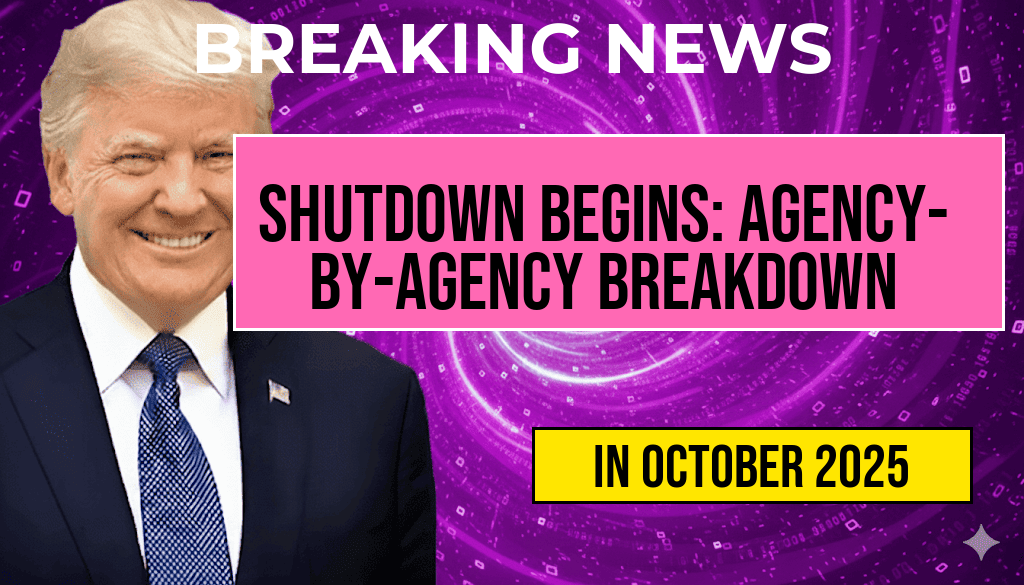The United States government has officially entered a shutdown period following the failure of Congress to agree on a funding bill before the deadline. As of now, numerous federal agencies have either halted operations or are operating with limited staff, directly affecting millions of Americans who rely on essential services. While some agencies, such as the Social Security Administration and Veterans Affairs, continue to provide critical benefits, others like the Internal Revenue Service (IRS) and Defense Department are scaling back or suspending non-essential functions. This shutdown marks a significant disruption across multiple sectors, raising concerns about economic stability, public safety, and the functioning of government services. The impact varies widely from agency to agency, with some services remaining accessible for the time being, and others ceasing operations until funding is restored.
Agency-by-Agency Breakdown of Operations During the Shutdown
Essential Services Continue, While Non-Essential Operations Halt
Federal agencies are categorized based on which functions are deemed essential for public safety, national security, or ongoing health needs. Agencies classified as providing essential services are authorized to operate with limited or no interruption, often with staff working without pay temporarily. Conversely, agencies performing non-essential functions typically suspend operations, furlough employees, or delay services until appropriations are approved.
Social Security Administration
- Status: Operational
- Services: Ongoing processing of retirement, disability, and survivor benefits. In-person services are limited, but telephone and online options remain available.
- Impact: Payments continue without interruption; however, delays in some administrative processes are possible due to reduced staffing.
Internal Revenue Service (IRS)
- Status: Partially operational
- Services: Most taxpayer assistance functions and audits are paused. However, tax refunds related to prior filings are processed, and the IRS continues to collect payments for existing tax liabilities.
- Impact: New audits and correspondence are delayed, and assistance hotlines are limited, complicating ongoing taxpayer interactions.
Department of Defense
| Function | Status |
|---|---|
| Active Military Operations | Continues without interruption |
| Non-Essential Administrative Functions | Furloughed or suspended |
| Military Benefits Processing | Operational, though some delays possible |
Transportation Security Administration (TSA)
- Status: Fully operational
- Services: Security screening at airports continues uninterrupted, ensuring air travel safety remains unaffected.
- Impact: TSA staff are working without pay, but the agency remains fully functional to prevent travel disruptions.
Other Major Agencies and Their Status
- Centers for Disease Control and Prevention (CDC): Operating at reduced capacity, focusing on essential health functions.
- Environmental Protection Agency (EPA): Non-essential programs are halted; emergency work on pollution control continues where necessary.
- FBI and Department of Homeland Security: Continue core security and law enforcement functions, with some administrative activities paused.
Implications and Public Impact
The shutdown’s immediate effects are felt most acutely by federal employees facing furloughs or delayed paychecks. Many contractors and service providers tied to government functions are also experiencing disruptions, impacting everything from national park operations to grant distributions. Essential services like Medicare, Medicaid, and food assistance programs remain largely unaffected, but delays in administrative processes could cause confusion among beneficiaries.
Financial markets and the broader economy are also sensitive to shutdown developments. Historically, even brief shutdowns have prompted uncertainty in markets and raised concerns about fiscal stability. The Treasury Department has indicated that it will prioritize debt payments, aiming to prevent a default, but ongoing uncertainty hampers economic confidence.
Looking Ahead
As negotiations continue in Congress, the outlook remains uncertain. Lawmakers face pressure from various constituencies to find a resolution that funds essential government functions without further disruption. The Biden administration has emphasized the importance of maintaining critical services, especially those affecting vulnerable populations, while lawmakers debate over budget priorities.
For the millions depending on government services, the key concern remains the duration of the shutdown. While some agencies have measures in place to operate temporarily, a prolonged shutdown could deepen disruptions, delay benefits, and complicate ongoing federal operations.
Understanding the specific status of each agency helps clarify which services are impacted and which continue. This transparency is vital for navigating the immediate challenges posed by the shutdown, and for assessing the longer-term implications on American lives and the economy.
For more details on government shutdown procedures and affected services, refer to official resources such as White House updates and the Government Publishing Office.
Frequently Asked Questions
What agencies are still operating during the government shutdown?
Essential agencies such as the Social Security Administration, IRS, Defense Department, and Transportation Security Administration (TSA) continue to operate to ensure critical services remain available.
Which government services are affected by the shutdown?
Many non-essential federal services are temporarily halted, including some administrative offices, grant programs, and public outreach. Specific agencies like the Department of Interior and EPA may have limited or no operations.
How does the shutdown impact Social Security payments?
Social Security payments generally continue without interruption during a government shutdown, as these are considered mandatory spending. However, some related services and customer support may experience delays.
Will the IRS still process tax returns and refunds?
During the shutdown, the IRS may experience delays in processing tax returns, refunds, and customer service. Many functions become limited until funding is restored.
What should travelers expect at airports with TSA operating during the shutdown?
The Transportation Security Administration (TSA) continues to operate, ensuring airport security and passenger screening. Travelers should still expect normal security procedures, though some airport administrative functions may be affected.

Leave a Reply